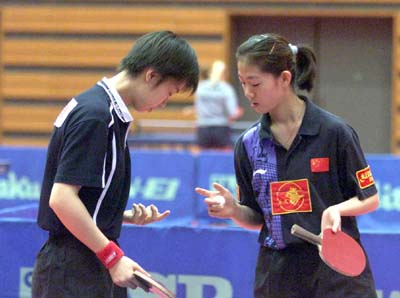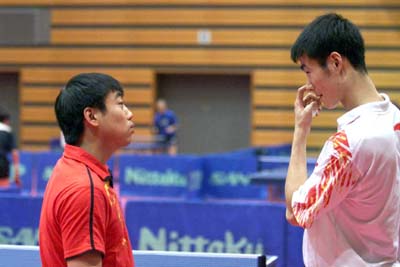 Zhang and Nu Jianfeng practicing in Osaka.
Zhang and Nu Jianfeng practicing in Osaka. In the just-concluded tie against Russia, China won easily with a score of 3-0. China played Kong, Wang, and Liu Guoliang, and the game scores were all 2-0. After the match, Liu said that because the hall is quite big, he felt the ball speed is less, and he has not totally adjusted yet. Kong also had the same impressions.
According to rules, a team has to be at the playing court 40 minutes before start time. The Chinese were there on time, but the Russians were late. Cai was nervous, because if the Russian team had defaulted, the Chinese would lose the chance to get used to the playing conditions. Fortunately the Russians got there before game time.
In Kong's match, his advantages were very obvious, but still Cai called a time-out in the second game. He asked Kong to be more aggressive, with more forward motions, and try to get into competition shape.
There was also a minor equipment problem. In Liu's match, the Seiko scoreboard got stuck at 7-7. The match was stopped for a while, but continued despite the problem.
Concurrent with the China-Russia contest was the Sweden-Belarus tie. Although Belarus is not a strong team, it has Samsonov, so it attracts attention. Samsonov played Persson first, and lost -16, 13, and -19. Then Waldner and Hakansson won the next two matches, and Sweden had a 3-0 victory.
Also worth watching was the Hong Kong-South Korea tie. Hong Kong has played a 5-match tie against Poland in the afternoon and won. If it could beat S. Korea, it will be the group winner. In the first match, Cheung Yuk played against Oh. He lost the first game 14-21, but then won the next two at 19 and 14. This gave Hong Kong a chance. In the second match, Li Jing was not expected to beat Kim, and indeed he lost 0-2. In the 3rd match, Ko Lai Chak and Ryu played to three games, and lost the decider 21-17. Ko had a chance in this match, so it was a disappointing loss. In the 4th, Cheung played Kim, and lost a close first game at 19. In the 2nd game, Kim got a big lead and won easily. So Hong Kong lost to S. Korea 1-3.
At 8:30 am Beijing time, the Chinese women's team played its first tie, and beat Canada 3-0. The Chinese team was at the court early, but there were some problems that took time to resolve.
Zhang Yining was on the team roster, but because her English name is close to Zhang Yingying's, the officials had the latter on the team list by mistake. There was one previous tournament in Europe when Zhang Yingying was mistaken to be Zhang Yining, and therefore given a high seeding, even though she had a very low world ranking. The other players complained, but that time Zhang Yingying played very well, just like a seeded player.
Today, there was another problem with the color of the uniforms. Both sides chose red, but there was against the rules. So there was a coin toss held, and China won to keep the red uniforms. The Canadians had to change to their white uniforms.
Even though Canada was not considered a strong team, the
Chinese still sent in their top line-up to get accustomed to the
playing conditions. Wang Nan, Li Ju and Zhang Yining played in
the 1, 2, and 3 position respectively. The mild surprise was Li
Ju dropping the second game against Geng. Afterwards, Lu told
reporters that he felt the match was quite normal. He said that
Geng is still a good player, and it is good to face a little
difficulty early in the tournament. He is not very satisfied with
Zhang's play, and he hopes that the players can get into better
form early. Click
here for photos of the 3 Chinese players in action.
On Sunday, while every player was trying to get used to the playing courts and the equipment, the reporters talked to the coaches of the Chinese, the Swedish and the Korean teams.
Chinese coach Cai answered the question of whether China would "give up" one or two medals. Cai said that China is stronger overall than its competitors, especially in women's events. But they are not so strong that it could control the outcome of the events. They are not familiar with the levels of the other teams, so the competition should be intense. There is no reason to talk about giving up medals, and they do not have that ability.. They will fight hard for every gold medal.
Cai also talked about the equipment. He said that even though the playing conditions are very good, there is a strange phenomenon: equipment from three different manufacturers are being used. Tables were from San-EI, TSP and Nittaku. In team play, TSP balls are being used, but in individual events, Nittaku's will be used. This creates more difficulty for the players to get used to the equipment, although the Chinese have used all these brands before.
The Swedish practiced on tables 1 and 2 after the Chinese finished their session. Their head coach Carlsson told reporters that in the last Worlds, they had a very difficult victory over China. "The 3-2 score showed that the difference was very small. Now that the big ball is used, we have a smaller winning chance. However, our team is in good shape. Waldner was having trouble adjusting to the bigger ball, but through the recent training, he is significantly better. Although he is still not as good as he was with the small ball, he has a mental advantage over every other player. In a big tournament, the mental qualities are often more important than technical abilities."
Korea is another major competitor of the Chinese team. Its
head coach commented on the bigger ball. "The size increase
leads to reductions in speed and spin, and places new demands on
the players. In order to make high quality shots, a player has to
be stronger physically, and this is to the Europeans' advantage.
Asians are affected negatively, but to different degrees. Koreans
are affected more. Other than Kim, all the Koreans are playing at
lower levels than before. But the bigger ball does not seem to
affect the Chinese as much, because China has many good players,
with good fundamentals, that play a great variety of styles. So
the Chinese have made better adjustments than us. We have only
been training for 20 days, so our first goal is to make it to the
semi-finals". Men's coach Ahn added that among men's teams,
China, Sweden and France are the strongest, with Korea
immediately following. They will try their best to make it to the
semi-finals, and then fight for even better results.
A late change put Bai Yang, the Chinese sensational teenager,
in the Osaka roster. Bai will now play mixed doubles with Zhan
Jian. Lin Ling will take Sun Jin's place in women's singles. Sun
still plays women's teams, women's doubles and mixed doubles.
This is a great chance for 24-year-old Lin Ling, who has the most
"European" style among the Chinese women. Lin placed
second two times in the giant round-robin in closed training, so
she deserves the chance.
There was a report, after the Loyang warm-up tournament, that Liu Guozheng said that Liu Guoliang has no chance in Osaka, because the latter cannot beat any of his teammates. After the report appeared, Liu Guozheng strongly denied ever making such comments. He said, " Liu Guoliang and I are good friends, and everyone can see his accomplishments. He still is very strong, especially against foreign players. It is impossible for me to have said such things to hurt our team, and I would never say these things ever. These rumors came from reporters of some small newspapers. They are intentionally trying to hurt the unity of our team".
Liu Guozheng has also talked to Liu Guoliang about this, and told him that maybe he should sue the reporter. But Liu Guoliang told Guozheng to not take it too seriously. "It's too tiring", he said.
On Sunday, Cai pleaded to the media not to make up stories.
This was because of the report that Liu Guozheng had belittled
Liu Guoliang. Cai had asked Liu Guozheng about this, and
understood that that report was absolutely untrue.
Korean head coach told reporters that their goals are: women's team finalist, men's team semifinalist, and gold medalist of the men's and women's doubles. He feels that their best chance is in women's doubles. The pair Ryu/Kim is the strongest Korean pair since the late eighties when Korea won the Olympic gold medal. Last year in the Brazil Open this pair beat Wang/Li to win the event. In the Olympics they lost to Wang/Li in the semis, but they actually had the advantage in most of that match. "Ryu is unshakable as a player, and Kim can hit hard when she is not expected to. The great wall of Wang/Li is not invincible", he said.
The men's doubles is a major focus for the Korean team, and their hopes lie not on Kim/Oh, but the pair Lee Chul Seung/Ryu Seung Min. Lee/Ryu started playing together before the Olympics, and they complement each other very well. The pair made it to the semifinals in the Olympics. Ryu, after graduating from high school, has been playing in Dusseldorf, and is very used to the European styles. He may be the dark horse of the tournament.
The Korean women's team will aim to get to the finals, and they think that the 1/8 finals will be the biggest challenge. Their opponents will be Japan, Singapore, North Korea, Hong Kong and Hungary. None of these teams will be easy. Once they get to the semifinals, they will have a chance for the gold, since they are very familiar with China and Taipei.
Facing the strong Chinese team, the Korean coach is not
afraid. "Since April 21st, we have been watching the Chinese
practice. They have changed a lot since the Olympics. To beat the
Chinese, we have to attack quick and early. Once in the rallying
stage, we will not do well against the Chinese, who have such a
rich set of attacking schemes".
 Zhang and Nu Jianfeng practicing in Osaka.
Zhang and Nu Jianfeng practicing in Osaka.
 Liu and Wang exchanging insights.
Liu and Wang exchanging insights.